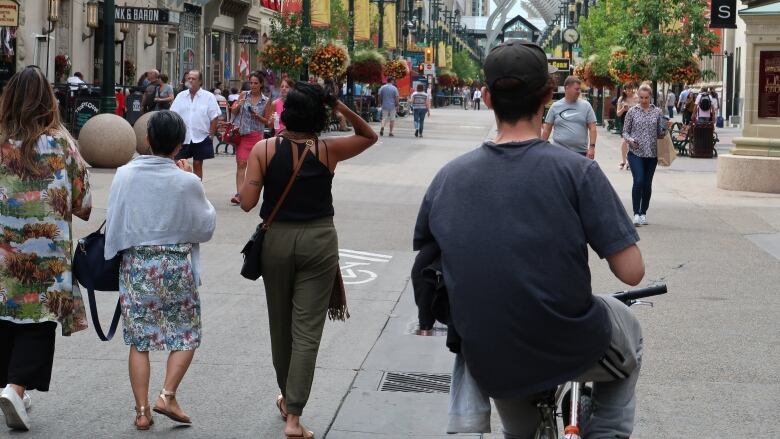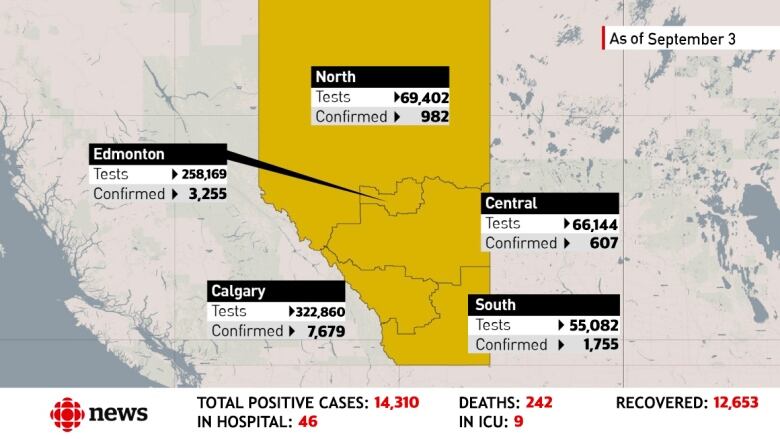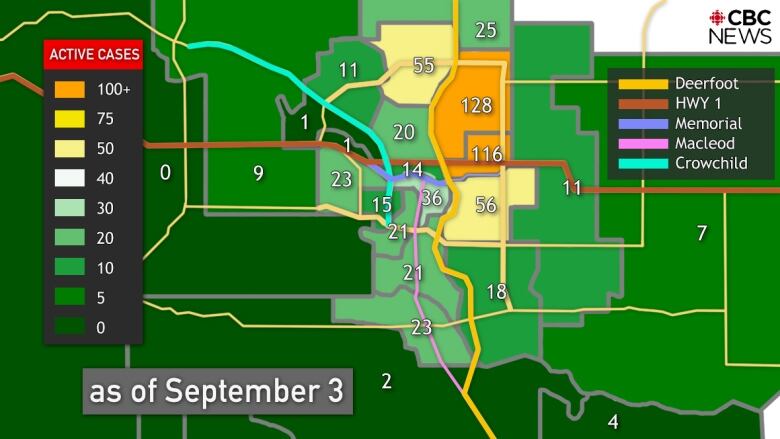What you need to know about COVID-19 in Alberta on Thursday, Sept. 3
Alberta is providing social assistance to 10,000 fewer people, primarily due to CERB

The latest:
- The province's tally of active casesof COVID-19continued to climb on Thursday, with 130 new cases, bringing the total to1,415, up from1,403 the day before.
- The Calgary Drop-In Centre said that as of Wednesday, five people staying in its main shelter downtown had tested positive for the novel coronavirus. One new case of COVID-19 was also reported at Calgary's Alpha House.
- The Calgary zone surpassed the Edmonton zone on Monday in terms of total active cases for the first time in weeks.
- Calgary now has 639 active cases, up from 632 on Wednesday, after dipping below 300 in August.
- The Edmonton zonehas declined to527, from 538 on Wednesday.
- Twelve regions around the province are under a "watch," which is declared when active cases surpass 50 per 100,000 people.
- Alberta could scale back its relaunch in particular sectors should cases substantiallyincrease, said Dr. Deena Hinshaw, the province's chief medical officer of health.
- The Alberta government will allow schools to decide how best to spend most of $262 million in federal funding to help with COVID-19 related costs,Education Minister AdrianaLaGrange said at a news conference Wednesday.
- Dr. Deena Hinshaw, the province's chief medical officer of health, will provide her next update on COVID-19 in the province on Friday.
- The Peace River School Division, northwest of Edmonton, posted a notice on its website saying it was delaying the start of its school year until after Labour Day.
What you need to know today in Alberta:
Social assistance caseloads in Alberta have dropped dramatically during the pandemic, with the provincial government providing income support to roughly 10,000 fewer households since March.
Albertans who had previously been receiving income support from the province but started receiving federalCERB payments have seen the provincial benefits clawed back.
The province exemptssome of the federal benefitfrom its income-support calculations, but for thousands of people receiving $2,000 per month under CERB, it adds up to a complete elimination of their provincial social assistance.
Fears over the spread of COVID-19 on Edmonton school buses are contributing to a city-wide driver shortage and students are expected to face delays in getting to class for weeks to come.
Meantime, theAlberta Union of Provincial Employees has filed a labour complaintagainst the Alberta government, alleging the province is violating the terms of its own single-site worker order at the Michener Centreby depriving dozens of workers of wages during the pandemic.
The Alberta government announced Wednesday it will allow schools to decide how best to spend most of $262 million in federal funding to help with COVID-19 related costs.

The province will distribute themajority of the funding, $250 million, to school authorities based on a per-student model, and it must be used to support additional COVID-19 related costs, Education Minister AdrianaLaGrange said at a news conference.
The funding can be used for staffing, adapting learning spaces,personal protective equipment, cleaning, supports for special needs students and online learning and teacher training.
The City of Edmonton will attempt to buy underused hotels and apartment buildings to house homeless people this fall and winter, council agreed in a motion Wednesday.
Mayor Don Iveson will ask the federal and provincial governments for money to purchase real estate that hasdropped in price because of theCOVID-19 pandemic.
CBC News is following four families as they navigate the return to school in the midst of the global pandemic, tracing how the reopening impacts them before and during the return. Here's the first instalment: Getting ready for school.
CBC Calgary also wants to hear from Alberta's parents, students and teachers in regards to how the process has gone so far.
Here's the regional breakdown of active cases reported on Thursday:
- Calgary zone: 639, up from 632 Wednesday.
- Edmonton zone: 527, down from 538 Wednesday.
- North zone: 174, up from 167.
- Central zone: 36, up from 32.
- South zone: 35, up from 31.
- Unknown: 4.
Find out which neighbourhoods or communities have the most cases, how hard people of different ages have been hit, the ages of people in hospital, how Alberta compares to other provinces and more in: Here are the latest COVID-19 statistics for Alberta and what they mean

What you need to know today in Canada:
As of1:30p.m. ET on Thursday,Canada had130,242confirmed and presumptive coronavirus cases. Provinces and territories listed 115,269of those as recovered or resolved. ACBC News tallyof deaths based on provincial reports, regional health information and CBC's reporting stood at 9,176.
Health experts say it's more important than ever to get the flu shot to avoid what some have termed a "twindemic" an influx of people becoming ill as influenza and the new coronavirus circulate at the same time.Here, experts weigh in on some questions you may have about getting a flu shot during thepandemic.
Canada has announced that it has signed deals with four U.S. companies to reserve millions of doses of COVID-19 vaccines under development inan effort to make sure Canadiansare at "the front of the line" when a vaccine becomes available.
Prime Minister Justin Trudeau is blamingprocessing "hiccups"forthe fact that many Canadians are reportingdelays in receiving theirCanada emergency response benefit payments.
A group of parents, concerned about the threat of COVID-19 in Quebec schools, will try to convince a judge Thursdayto order the province to loosen its rules on who can take classes online.
The parentsare seeking an injunction that would allow them to keep their children home from school to learnremotely, even though they don't qualify for a medical exemption.
Meantime, the COVID Alert app is now live in Newfoundland and Labrador, as the province has become the second in Canada to sign upfor the federal government's exposure notification system.Saskatchewan, too,will be participating in Ottawa's app.
Self-assessment and supports:
Alberta Health Services has an online self-assessment tool that you can use to determine if you have symptoms of COVID-19, but testing is open to anyone, even without symptoms.
The province says Albertans who have returned to Canada from other countries must self-isolate. Unless your situation is critical and requires a call to 911, Albertans are advised to call Health Link at 811 before visiting a physician, hospital or other health-care facility.
If you have symptoms, even mild, you are to self-isolate for at least 10 days from the onset of symptoms, until the symptoms have disappeared.
You can find Alberta Health Services' latest coronavirus updates here.
The province also operates a confidential mental health support line at 1-877-303-2642 and addiction help line at 1-866-332-2322, both available 24 hours a day.
Online resources are available for advice on handling stressful situations and ways to talk with children.
There is a 24-hour family violence information line at 310-1818 to get anonymous help in more than 170 languages, and Alberta's One Line for Sexual Violence is available at 1-866-403-8000, from 9 a.m. to 9 p.m.
With files from The Canadian Press













_(720p).jpg)


 OFFICIAL HD MUSIC VIDEO.jpg)
.jpg)



























































































